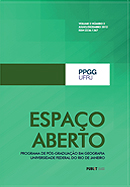A City to Live or Work In? Contradictions Present in the Spatial Distribution of Economic Activities, Transport and Social Conditions: A Case Study of the City of Rio de Janeiro
DOI:
https://doi.org/10.36403/espacoaberto.2017.16317Keywords:
Distribution of Activities, Transport, Socio-Spatial SegregationAbstract
Although there is currently an effort by the transport sector of Rio de Janeiro to
demonstrate the contribution of urban mobility for addressing social, environmental and economic issues, the claims are contradictory because urban restructuring continues to cause the uneven distribution of jobs in the city, high levels of social inequality and chronic problems with poor urban mobility, as seen in high levels of private transportation use, low levels of public transport service, long journeys and travel times. This work uses a geographical perspective to evaluate the relationship between available transport infrastructure and the dynamics of jobs and businesses in the city of Rio de Janeiro. We seek to evaluate whether the existing and projected means of transportation in the city merely attend to the demands of historically established interest groups or create ruptures and new spatial logics which reduce socio-spatial differences.


